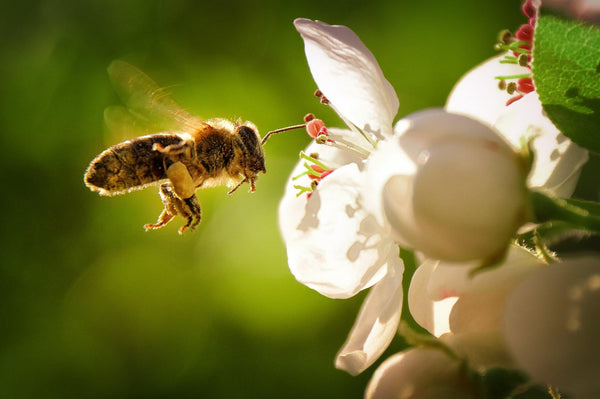Protecting Our Pollinators: You Make a Difference
You're probably familiar with the beautiful orange monarch butterfly, and you may have heard about this incredible insect's 2,000-mile journey from Mexico all the way up to Canada. Unfortunately, the population of these gorgeous butterflies has decreased by 97% since the 1980s.
Sadly, the plight of the monarch butterfly is mirrored in many other insect species, including the crucial ones that pollinate our crops, keep our flowers blooming, and add to the planet's biodiversity. Why are pollinators so important, and what is causing their decline? Most importantly, what can we do with our lifestyle and purchasing decisions to make a difference?
The Plight of Pollinators
Birds, bees, butterflies, bats — what do all these animals have in common? These commonly-overlooked creatures are our planet's pollinators, responsible for the silent (but crucial) work of helping plants reproduce. Though some plants can be pollinated by wind or water, many of our most important plants rely on insects and small animals to transplant pollen from plant to plant to ensure reproduction.
Incredibly, half of the world's raw materials, fibers, and oils rely on these little animals. Up to 95% of the planet's fruits and vegetables require bees, birds, and other animals in order to survive. So in addition to providing the food we need to survive, pollinators ensure that our planet is diverse, beautiful, and lush.
The problem? In recent years, pollinators have been dying off in record numbers. In fact, the U.N. has reported that 40% of the world's pollinators may face extinction. Loss of pollinators has devastating consequences since our global food supply is entirely dependent on them. Most importantly, the ecosystem as a whole relies on these humble insects to thrive.
The decline of species like bees and butterflies has to do with a few different factors:
- Habitat loss due to human development and agriculture
- Pesticide use in food or textile production can kill and sicken pollinators
- Parasites and diseases
- Loss of native plant species that pollinators thrive on
Protecting Pollinators: Your Lifestyle & Purchases Matter
Recently in the United States and across the globe, record numbers of bee colonies have died. Last winter in the U.S., honeybee keepers lost 40% of their hives, an unprecedented winter hive loss. Despite the grim statistics, however, there is hope. As a consumer, your lifestyle and purchasing decisions can make a difference in protecting the precious pollinators that keep our ecosystem flourishing. Here are some ways you can help:
1. Start a Garden
If you have the space on your property, one of the best things you can do to protect pollinator populations in your neighborhood is to start a pollinator habitat garden. According to the National Wildlife Federation, a pollinator habitat garden should feature native species of plants, ensure that plants are clustered close together, only use clean water, and avoid the use of pesticides.
2. Be Picky about Textiles
Though organic cotton can be grown with sustainable practices, most conventionally-produced cotton requires massive amounts of chemical fertilizers and pesticides. In fact, it's thought that millions of birds die every single year in the U.S. as a result of the chemicals used for cotton and other non-organic crops.
The solution? When shopping for clothes, towels, and other textiles, be mindful of the material you're choosing. Choose organically-grown cotton when possible, or try more environmentally-friendly options like hemp, linen, and recycled fibers.
3. Eat Organic
Since certified organic food is grown without the use of chemical pesticides, it's definitely a more pollinator-friendly choice. Look for the organic label on the foods that you purchase at the grocery store. Better yet, try to buy from farmers' markets in your area, as this will help support the native pollinator population where you live.
4. Choose Sustainably Harvested Goods
If you're the type of person who likes to incorporate holistic products like herbs and essential oils into your wellness routine, then it's especially important to ensure that you're purchasing from companies who promote ethical growing practices.
Because products like essential oils are distilled from mass quantities of flowers and other plants, unethical growing practices can result in native habitats being destroyed just to create the product. Luckily, it's easy to avoid this unfortunate practice by simply purchasing from companies who prioritize sustainable harvesting methods.
Pollinator Partnership
Despite some of the scary statistics, there's no need to give up hope on the future of pollinators. Amazing organizations like Pollinator Partnership work to raise awareness about pollinator issues and work with conscientious businesses to make a difference. By making mindful decisions — and choosing to support businesses that donate to pollinator causes — you can help protect the bees, birds, and butterflies that support our beautiful ecosystem.
If you've enjoyed this post, or would be interested in more posts of this type, please let us know here.



